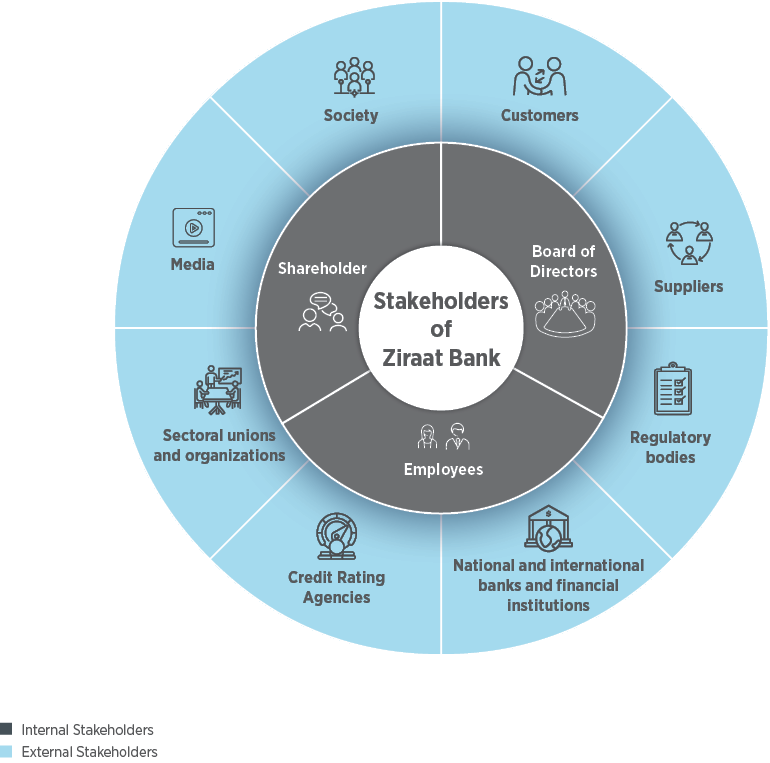Stakeholder relations serve a crucial role in determining and implementing an effective sustainability strategy at Ziraat Bank.
The stakeholder audience refers to the groups that may be directly or indirectly affected by an organization’s activities and value production process. The participation of these groups in the organization’s corporate governance and operational processes helps determine the strategic priorities and develop relevant policies.
Ziraat Bank identifies the sustainable development opportunities offered by the economic environment with effective stakeholder management and enhances its corporate performance by developing multifaceted collaborations.
The Bank’s shareholder, Board of Director and, employees, constitute Ziraat Bank’s main stakeholder group. The Bank carries out its operations in constant communication and cooperation with its stakeholders in this group.
In addition to its internal stakeholders, the bank also maintains close relationships with its external stakeholders, including customers, suppliers, regulatory institutions, national and international banks and financial institutions, credit rating agencies, sectoral unions and organizations, media and society.

Stakeholder Communication
In addition to its main stakeholder group, Ziraat Bank is also in close contact with its other stakeholders including regulatory bodies, international banks, investors and credit rating agencies, the media, unions in various sectors, organizations and the broader society.
|
Stakeholder Group |
Interaction Frequency |
Interaction Channels |
Internal Stakeholders |
Shareholder |
Annual General Meeting and in other necessary situations |
General Assembly Meeting (annual). Ziraat Bank also conducts studies to enlighten the public through the Financial Institutions and Investor Relations Unit. Annual reports and other presentations and statements posted on the Public Disclosure Platform come under this scope. |
Board of Directors |
As part of the business cycle - when deemed necessary |
Board of Directors meetings, the number and frequency of which are determined in accordance with the Turkish Commercial Code, Banking Law and other relevant legislation. |
|
Employees |
As part of the business cycle - daily |
Employment process, training programs for employees, performance evaluation meetings, internal communication channels, executive interviews and informing/sharing meetings. |
|
External Stakeholders |
Customers |
As part of the service cycle - on a 24/7 basis |
Ziraat Bank branches, alternative distribution channels (ATM, internet banking, mobile banking, call center), customer relations representatives, customer visits. |
Suppliers |
As part of the business cycle - daily |
The procurement process of all services outsourced by Ziraat Bank. |
|
Regulatory bodies |
As part of the business cycle - when deemed necessary |
Reports, correspondence and related meetings made in accordance with the legislation |
|
National and international banks and financial institutions |
As part of the business cycle - daily |
Meetings and contacts held with World Bank, European Investment Bank etc. and other financial institutions which the Bank is in cooperation with. |
|
Credit Rating Agencies |
As part of the business cycle - when deemed necessary |
Meetings, reporting, presentations, correspondence. |
|
Sectoral unions and organizations |
As part of the business cycle - daily |
Meetings, presentations and daily communication actions. |
|
Media |
As part of the business cycle - when deemed necessary |
Actions to enlighten the public with a transparent and quick approach (press meetings, press bulletins, interviews, responding to questions etc.). |
|
Society |
As part of the social responsibility projects |
Corporate social responsibility projects and donation activities. |




